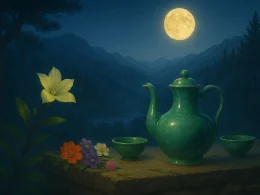Far off in the clouds stand the walls of Hanyang,
Another day's journey for my lone sail...
Though a river-merchant ought to sleep in this calm weather,
I listen to the tide at night and voices of the boatmen.
...My thin hair grows wintry, like the triple Xiang streams,
Three thousand miles my heart goes, homesick with the moon;
But the war has left me nothing of my heritage --
And oh, the pang of hearing these drums along the river!
Original Poem
「晚次鄂州」
卢纶
云开远见汉阳城,犹是孤帆一日程。
估客昼眠知浪静,舟人夜语觉潮生。
三湘衰鬓逢秋色,万里归心对月明。
旧业已随征战尽,更堪江上鼓鼙声!
Interpretation
Written between 756-758 AD during the An Lushan Rebellion, this poem captures Lu Lun's southern exile journey. Composed while passing through Ezhou (modern Wuchang, Wuhan), it transcends mere travelogue to become a profound meditation on displacement - intertwining river scenery with complex emotions of wandering, melancholy, homesickness, and war-weariness.
First Couplet: "云开远见汉阳城,犹是孤帆一日程。"
Yún kāi yuǎn jiàn Hànyáng chéng, yóu shì gū fān yī rì chéng.
Clouds part, revealing distant Hanyang; yet my lone sail still needs a day's voyage.
The opening blends momentary joy at seeing land with the bitterness of "lone sail," reflecting the exile's yearning for stability. Hanyang becomes both geographical destination and psychological symbol of home.
Second Couplet: "估客昼眠知浪静,舟人夜语觉潮生。"
Gū kè zhòu mián zhī làng jìng, zhōu rén yè yǔ jué cháo shēng.
Merchants nap by day - waves calm; boatmen talk at night - tides rising.
These diurnal river scenes mirror the poet's restless psyche. The peaceful day/night contrast underscores his perpetual unease - physically present yet mentally unsettled.
Third Couplet: "三湘衰鬓逢秋色,万里归心对月明。"
Sānxiāng shuāi bìn féng qiū sè, wàn lǐ guī xīn duì yuè míng.
In Three-Xiang region, autumn finds my graying temples; under bright moon, my heart journeys ten thousand miles home.
Intensified emotion emerges: exile in Three-Xiang during melancholy autumn, with moonlit homesickness amplifying the sorrow. The luminous moon ironically darkens his despair.
Fourth Couplet: "旧业已随征战尽,更堪江上鼓鼙声!"
Jiù yè yǐ suí zhēngzhàn jìn, gèng kān jiāng shàng gǔpí shēng!
My past life consumed by war; how can I bear more battle drums on this river!
The climax unleashes pent-up anguish: war destroyed his former life, and now fresh conflict threatens. The final outcry transforms personal grief into universal anti-war protest.
Holistic Appreciation
This "dusk mooring" poem chronicles both physical journey and spiritual odyssey through turbulent times. From hopeful glimpses of Hanyang to merchants' rhythms, from moonlit longing to furious denunciation of war, it progresses with controlled intensity. Lu Lun masterfully interweaves personal observations with epochal tragedy - where a traveler's minor discomforts reflect civilization's collapse. The abrupt yet resonant ending makes "ruined past" and "war drums" symbolize an entire generation's trauma.
Artistic Merits
- Scene-emotion fusion: Natural imagery becomes psychological landscape
- Architectural structure: Clear four-stage emotional progression
- Linguistic restraint: Deceptively calm lines conceal deep wounds
- Authentic voice: Avoids ornate allusions for raw, relatable feeling
Insights
More than personal diary, this poem documents war's human cost. It reminds us how individual lives mirror historical currents, and how exile/displacement remains timeless trauma. The poet's delicate brushstrokes preserve both undying nostalgia for home and desperate yearning for peace - emotions that resonate across centuries to modern readers confronting similar upheavals.
Poem translator
Kiang Kanghu
About the poet

Lu Lun (卢纶), 748 - 798 A.D., was a native of Yongji, Shanxi Province, and was one of the "Ten Scholarly Men of the Dali Dynasty". Lu Lun was a judge of the Marshal's Office in Hezhong, and he served as the inspector of the Ministry of Revenue. His poems were more eloquent and liberal, with many works of farewells and rewards, as well as works reflecting the life of sol












